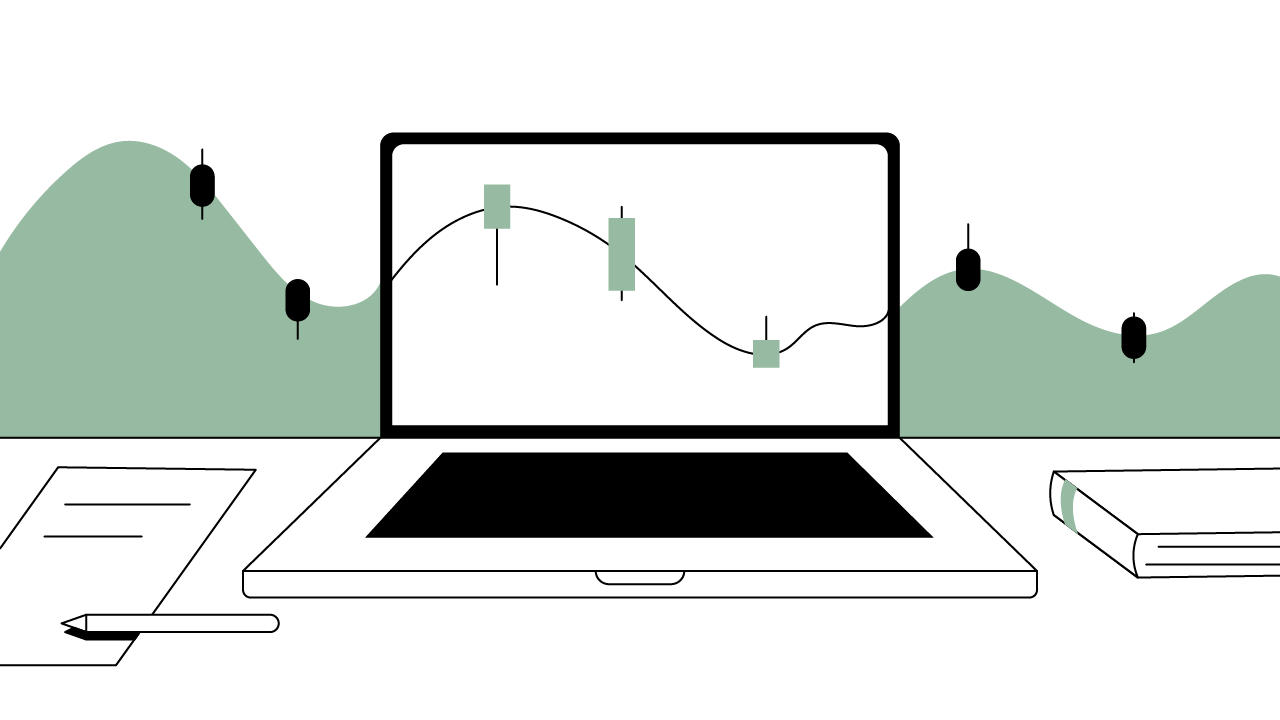Contents
What Is Crypto Spot Trading?
How Does Spot Trading Differ From Futures or Margin Trading?
How Does Spot Trading Differ From Forex Trading?
How Does Spot Trading Work?
What Is a Spot Market?
What Are the Advantages of Spot Trading?
What Are the Disadvantages of Spot Trading?
When Is Spot Trading Right?
A Final Word on Spot Trading
Spot Trading in Crypto: Pros, Cons, and How It Works
Learn the basics of crypto spot trading, including how it works, its benefits, and potential drawbacks. Discover if spot trading is the right choice.
Updated January 22, 2025 • 6 min read

Summary
This article covers what spot trading is, how it works, its pros and cons, and when it might be the right choice for you.
Cryptocurrency trading has opened exciting new avenues for investors, providing unique opportunities and challenges.
Among the various trading methods, spot trading stands out for its simplicity and immediacy. Whether you're a beginner or an experienced trader, spot trading offers a straightforward way to buy and sell digital assets.
What Is Crypto Spot Trading?
In cryptocurrency, spot trading refers to the immediate purchase and sale of digital assets at their current market price. Spot trades are executed “on the spot,” meaning at the current price in the market.
Once a spot trade is complete, ownership of the asset transfers instantly, allowing it to be held in a digital wallet or traded further.
Unlock the future of money on Gemini
Start your crypto journey in minutes on the trusted crypto-native finance platform
This approach differs from futures trading or derivatives, where traders speculate on the future price of an asset without owning it outright. With spot trading, you gain direct ownership of the asset at the time of purchase, which appeals to those who prefer a straightforward approach to crypto investment.
For those taking their first steps in crypto, our guide to crypto for beginners provides useful insights.
With Gemini, spot trading is simplified, allowing users to select their preferred cryptocurrency, choose an order type, and execute the trade at the market price. Beginners are often drawn to spot trading as it is less complex than leveraged products and derivatives, making it a user-friendly entry point.
How Does Spot Trading Differ From Futures or Margin Trading?
Spot trading is often more straightforward and involves less risk than other trading types, such as futures or margin trading. While spot trading avoids the risks associated with leverage, the cryptocurrency market is volatile and carries the potential for significant losses.
For example, margin trading involves borrowing funds to increase buying power, which can magnify profits but also may lead to higher risks if the market moves unfavorably. In contrast, spot trading does not involve leverage, so the risk of losing more than the initial investment is eliminated.
Additionally, spot trading avoids some of the complexities of futures trading, where assets are bought or sold at a predetermined price in the future. In spot trading, transactions are based on the real-time price, and there are no future contract expirations.
This simplicity appeals to those who are new to trading or looking for a hands-on approach without managing the intricacies of other trading types. To better understand the difference, see our guide to market and limit orders.
How Does Spot Trading Differ From Forex Trading?
Spot trading in crypto shares certain characteristics with forex trading, as both involve the exchange of one currency (or crypto asset) for another at the current market rate.
However, forex markets are centralized, often subject to government regulations and trading hours, while crypto markets are decentralized, operating on blockchain networks without a central governing authority.
This decentralized nature can result in increased volatility in crypto markets, as prices fluctuate based on supply and demand without the oversight typical in forex. Additionally, forex trading is generally limited to weekdays with set trading hours, while crypto trading is available 24/7 on global platforms like Gemini.
How Does Spot Trading Work?
Crypto spot trading involves two main types of orders:
Market Orders: A market order executes instantly at the current market price. This is ideal for traders prioritizing speed over price precision, as it ensures rapid execution, although minor price fluctuations can still occur due to volatility.
Limit Orders: A limit order allows traders to specify a price at which they want to buy or sell an asset. The trade executes only if the market reaches the specified price, offering greater control over the transaction but without guaranteeing immediate execution.
Spot trades on platforms like Gemini are processed through a digital order book, where open buy and sell orders are listed by price. When a buyer’s bid matches a seller’s ask, the trade is completed. Order books create a transparent, efficient marketplace for executing trades.
Liquidity and bid-ask spreads are also crucial in spot trading. In high-liquidity markets, bid-ask spreads narrow, which helps facilitate faster and more favorable trade executions.
What Is a Spot Market?
A spot market is where spot trades occur, driven purely by supply and demand in real time. Unlike futures markets, where prices are based on expectations for a future date, spot markets reflect the current price of an asset.
Spot markets allow for instant asset transfers, which can be advantageous for traders who want immediate control over their holdings.
What Is Spot Price?
The spot price of an asset represents its current market price for immediate purchase or sale. This price is continuously updated based on real-time trades and market activity, providing a transparent view of an asset’s value at any given moment.
Unlike futures prices, which include factors such as expected interest or storage costs, the spot price reflects current demand and supply, making it a reliable indicator of an asset’s immediate value.
What Is Spot Rate?
In cryptocurrency trading, the spot rate is the exchange rate at which one cryptocurrency can be traded for another at a specific point in time.
This rate changes based on current market conditions, and it’s crucial for traders who need accurate pricing for quick exchanges or conversions.
Spot Rate vs. Forward Rate
The distinction between the spot rate and the forward rate is essential in understanding how prices are set in different types of markets. The spot rate applies to immediate transactions, while the forward rate is for contracts settled at a future date, often reflecting market expectations of future value. Spot trading focuses solely on the spot rate, as trades are executed instantly without regard for future prices.
Over-the-Counter (OTC) vs. Foreign Exchange
In addition to traditional spot markets, large transactions can be conducted over-the-counter (OTC). OTC trading occurs directly between two parties and can be beneficial for substantial trades to avoid impacting the market price.
Unlike the foreign exchange (forex) market, which operates in a regulated and centralized environment, OTC trades in crypto offer more flexibility and privacy, although they lack the transparency and oversight associated with forex markets.
What Are the Advantages of Spot Trading?
Spot trading offers several benefits, especially for those interested in direct asset ownership:
Real-Time Pricing
Spot trading gives traders immediate access to the market price of an asset, allowing them to make informed decisions and respond quickly to price changes. Real-time pricing offers transparency and immediacy that’s appealing for short-term strategies.
Wide Range of Cryptocurrencies and Trading Platforms
Spot trading on platforms like Gemini provides opportunities for diversification, though individual results will vary based on market conditions and trading strategies. Platforms like Gemini offer a broad range of cryptocurrencies, enabling users to diversify their portfolios. The availability of numerous trading options attracts traders with different investment goals.
Less Risky Than Margin Trading
Because spot trading doesn’t involve leverage, the potential losses are limited to the initial investment, making it a conservative option for those cautious about market volatility.
What Are the Disadvantages of Spot Trading?
While spot trading has its advantages, it also has limitations:
Volatility
The cryptocurrency market’s volatility can lead to significant price swings, and spot trading doesn’t include hedging mechanisms like futures or options trading.
This exposure to price fluctuations means that spot traders must be prepared for sudden losses. To better understand this volatility in crypto markets, our guide can provide insights.
Less Flexible Than CFD or Futures Trading
Spot trading is more limited than CFD (contracts for difference) or futures trading, as it lacks options for short-selling or leveraging trades. This lack of flexibility can be a drawback for traders looking to profit from a broader range of market conditions.
When Is Spot Trading Right?
Spot trading may be a suitable option for:
Short-Term Trading: Traders aiming to capitalize on short-term price movements may prefer the immediacy of spot trading. The ability to buy and sell assets quickly allows traders to act on short-lived price fluctuations without needing to manage complex contracts or margin positions.
Beginner Trading: Spot trading’s straightforward nature makes it an ideal entry point for those new to crypto. Beginners benefit from spot trading by gaining exposure to price movements in real-time markets without the added risks and complications of leveraged or derivative products.
A Final Word on Spot Trading
Spot trading is a popular choice among cryptocurrency traders, offering a direct and transparent method to buy and sell digital assets.
With immediate ownership and real-time pricing, spot trading appeals to beginners and long-term holders alike. However, traders should be mindful of the inherent volatility and lack of flexibility compared to futures or CFD trading.
Understanding the fundamentals of spot trading can help you make informed decisions that align with your financial goals. For those ready to start trading, Gemini provides a secure platform designed to make spot trading accessible and user-friendly.
*This material is for informational purposes only and is not (i) an offer, or solicitation of an offer, to invest in, or to buy or sell, any interests or shares, or to participate in any investment or trading strategy, (ii) intended to provide accounting, legal, or tax advice, or investment recommendations, or (iii) an official statement of Gemini. Gemini, its affiliates and its employees do not make any representation or warranties, expressed or implied, as to accuracy or completeness of the information or any other information transmitted or made available. Buying, selling, and trading cryptocurrency involves risks, including the risk of losing all of the invested amount. Recipients should consult their advisors before making any investment decision. Any use, review, retransmission, distribution, or reproduction of these materials, in whole or in part, is strictly prohibited in any form without the express written approval of Gemini.
Cryptopedia does not guarantee the reliability of the Site content and shall not be held liable for any errors, omissions, or inaccuracies. The opinions and views expressed in any Cryptopedia article are solely those of the author(s) and do not reflect the opinions of Gemini or its management. The information provided on the Site is for informational purposes only, and it does not constitute an endorsement of any of the products and services discussed or investment, financial, or trading advice. A qualified professional should be consulted prior to making financial decisions. Please visit our Cryptopedia Site Policy to learn more.

Is this article helpful?


